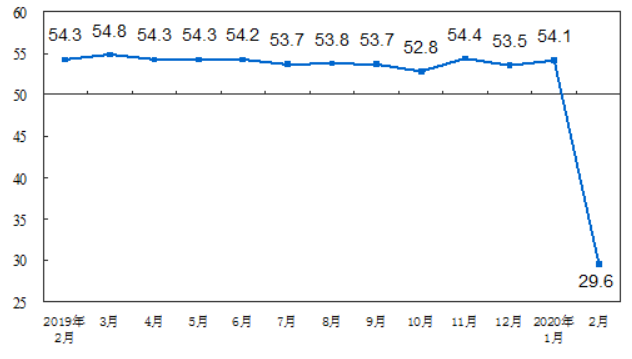
Harris&Ewing National Emergency War Garden Commission display, Wash. DC 1918
Numbers are rising very fast in South Korea, Iran and Italy. Total cases were up 841, 621, 901, 1,190, 1,314 in the past few days. Today: 1,950.
Major batch of new cases expected today from South Korea due to intensified testing.
• Cases 85,683 (+ 1,950 from yesterday’s 83,733)
• Deaths 2,933 (+ 73 from yesterday’s 2,860)
• South Korea 813 new cases, total 3.150, 16 deaths, one case of reinfection
• Italy 896 (yesterday 653) cases, 21 deaths
• Iran 593 (yesterday 245) cases, 26 deaths
• Japan 241 (+705 Diamond Princess)
• China 427 new cases and 47 new deaths, total 2,835
• UK 20 cases, first death is Diamond Princess’s 6th death
• Germany 60 cases
• US 66 cases
• France cases 57 from 38 yesterday
• First case: Israel (3 cases), Mexico, Iceland, Azerbaijan, Wales, Belarus, Estonia
Trump names Pence, Kudlow, Mnuchin, aka an economic team, to face the crisis. China tries something similar by talking about what happens when the outbreak is over.
From SCMP:
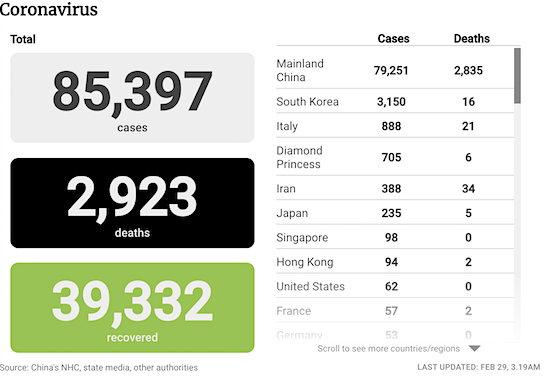
From Worldometer (Note: mortality rate down to 7%)
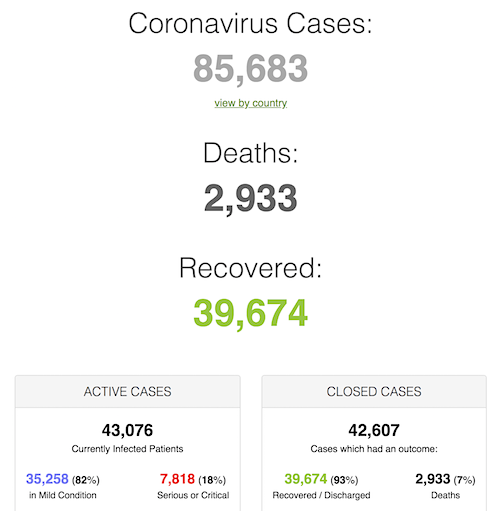

Xi’s biggest worry.
• China Reports Catastrophic Data: PMIs Crash To Record Lows (ZH)
[..] it turns out that Nomura’s dire forecast was optimistic, because moments ago China’s National Statistics Bureau reported the latest, February PMIs and they were absolutely catastrophic: Manufacturing PMI crashed to 35.7 in Feb, far below the 45.0 consensus estimate, and sharply down from 50.0 in January. A record low. Non-Manufacturing PMI plummets to 28.9, also far below the 50.5 consensus, estimate, and down nearly 50% from the 54.1 in Jan. This too was a record low. Putting these numbers in context, they are far, far worse than the prints for both series reported during the financial crisis, when the mfg PMI dropped to “only” 38.8, while the non-manufacturing PMI never even contracted.
What is even more ominous is that while China’s non-mfg PMI has traditionally been stronger, in February not only did it collapse into deep contraction, but it plunged to 5 points below where the manufacturing sector currently finds itself, a catastrophic 20-handle. This means that China’s service industries, long seen as the guiding light to China’s successful transition away from a manufacturing-led economy, is now devastated. Commenting on the unprecedented number, Bloomberg’s China economist Tom Orlik said that “the first credible gauge of how China’s economy is fairing under virus lock down – the official PMI – is pointing to a brutal drop into contraction.” Well, no: anyone who read our recent series analyzing “high-frequency”, real-time Chinese data already was already aware of the catastrophic collapse in China’s economy.
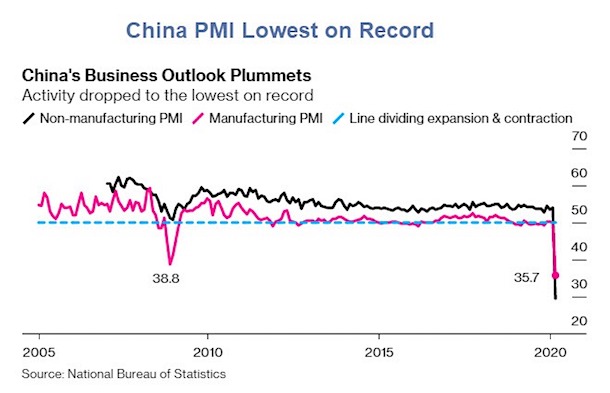

Because the testing issue was’t confusing enough yet.
• New York Scrambles To Replace US Government’s Faulty Coronavirus Test Kits (R.)
New York health officials are trying to get their own coronavirus testing kits up and running after getting stuck with faulty tests from the federal government that they said left them unable to diagnose people quickly in the nation’s most populous city. New York state’s Department of Health filed an emergency application on Friday with the U.S. Food and Drug Administration (FDA) to be allowed to use a testing kit for the new coronavirus it has developed in-state, according to an official involved in the process. “Upon FDA approval, which we believe is imminent, New York State’s public health laboratory, the Wadsworth Center, can immediately begin testing,” Jonah Bruno, a spokesman for the state’s Department of Health, wrote in an email.
Public health officials say the ability to test locally and get results within hours will be critical to a rapid response to the fast-spreading virus that originated in China, causing a sometimes fatal respiratory illness, and has spread to 46 countries. The weeks-long struggle to expand local testing has been criticized as an early misstep in the response by U.S. President Donald Trump’s administration to the outbreak. Three weeks ago, the FDA gave the green light for state and local labs to start using a testing kit developed by the U.S. Centers for Disease Control and Prevention (CDC). But most labs that received the kits complained they had faulty components and produced inconclusive results, which the CDC later acknowledged.
[..] The CDC kits were meant to work by comparing a sample swabbed from a patient’s nose or mouth against three distinctive stretches of the virus’ genetic material, which are in small tubes labeled N1, N2 and N3. Most labs only had issues with the kit’s third component, N3. After reviewing their data, the FDA and CDC told labs this week that the tests would work fine if they only looked for the N1 and N2 bits of the virus, ignoring the faulty N3 component. But in New York, both the state lab and the New York City lab said that in their kits the N1 component was also flawed, and that the workaround proposed by the CDC and FDA was of no use.

US sanctions kept Iran from buying the same faulty test kits that New York is using?!
• US Sanctions on Iran Helped Coronavirus Spread Undetected (NI)
The Trump administration is partially reversing course on economic sanctions that have slowed down Iran from importing coronavirus test kits as the country faces down the most deadly COVID-19 outbreak outside of East Asia. Iranian authorities have confirmed 388 cases of the new coronavirus disease as of Friday afternoon. U.S. sanctions, the Iranian government’s record of dishonesty, and the elusive nature of the virus itself have made it difficult to understand the true extent of the epidemic. The U.S. Treasury announced on Thursday morning that it was lifting some terrorism-related sanctions on the Central Bank of Iran, which re-opens a channel for humanitarian trade that had been closed since September 2019. The announcement does not lift the restrictions on humanitarian trade with other Iranian banks under terrorism-related sanctions.
Iran’s healthcare sector has blamed the banking sanctions for a lack of testing equipment to diagnose COVID-19. Thirty-four people have reportedly died from the virus in Iran, suggesting a large number of undiagnosed cases of COVID-19, which scientists believe has a two percent mortality rate. In fact, independent researchers estimate that eighteen thousand Iranians may have been infected already. “Several international companies are ready to ship the coronavirus diagnosis kit to Iran, but we cannot pay them,” said Ramin Fallah, vice president of the Iranian Union of Importers of Medical Equipment, in a Monday interview with Iranian media. “They also insist that the money should only be sent through banks. Although there are ways to get around [sanctions], it is time-consuming.”
[..] Iranian authorities have not inspired confidence in their current ability to deal with the outbreak transparently, either. [..] Officials have downplayed the extent of the outbreak even as the virus spreads within the government itself. Member of Parliament Ahmad Amirabadi Farahani claimed on Monday that fifty people had died in his home district of Qom alone, but Deputy Health Minister Iraj Harirchi denied accusations of a coverup. On Tuesday, Harirchi announced that he had contracted COVID-19. Another lawmaker, Mahmoud Sadeghi, tested positive for the virus the same day. But President Hassan Rouhani continued to claim that the viral panic was worse than the virus itself, denouncing “foreign propaganda,” refusing to quarantine cities, and promising a return to normalcy.
By Wednesday, the tone in the Rouhani administration turned to panic as cabinet member Ma’soumeh Ebtekar was diagnosed with COVID-19 and retired Amb. Hadi Khosrowshahi suddenly died of the disease. The government proceeded to ban Chinese nationals from entering the country, canceled flights to India, halted religious pilgrimage groups, and canceled Friday prayers in major cities. Presidential advisor Hesameddin Ashena called for “taking the situation seriously” and “not politicizing the issue.”

The Party was not amused.
• Chinese Lab That First Shared Virus Genome Closed For ‘Rectification’ (SCMP)
The Shanghai laboratory where researchers published the world’s first genome sequence of the deadly coronavirus that causes Covid-19 has been shut down. The laboratory at the Shanghai Public Health Clinical Centre was ordered to close for “rectification” on January 12, a day after Professor Zhang Yongzhen’s team published the genome sequence on open platforms. It closed temporarily the following day. The release of the data helped researchers develop test kits for the virus. “The centre was not given any specific reasons why the laboratory was closed for rectification. [We have submitted] four reports [asking for permission] to reopen but we have not received any replies,” a source with the centre said, requesting anonymity because of the matter’s sensitivity.
“The closure has greatly affected the scientists and their research when they should be racing against the clock to find the means to help put the novel coronavirus outbreak under control,” the source said. The laboratory is a Level 3 biosafety facility, the second-highest level, and passed an annual inspection by the China National Accreditation Service for Conformity Assessment on January 5. It also obtained the required credentials to conduct research on the coronavirus on January 24. It was not clear whether the closure was related to the publishing of the sequencing data before the authorities. China’s National Health Commission announced hours after the release by Zhang’s team that it would share the genome sequence with the World Health Organisation. It later emerged that the information had been sent through the officially designated Wuhan Institute of Virology.
[..] Zhang’s team isolated and finished the genome sequence of the then-unknown virus on January 5, two days before China’s official announcement that mysterious pneumonia cases in Wuhan were caused by a hitherto unknown coronavirus.
The Shanghai centre reported its discovery to the National Health Commission on the same day and recommended “relevant prevention and control measures” be taken in public places, because the patient from whom the sample was collected had suffered very severe symptoms and the virus resembled a group previously found in bats. The team made the finding public on January 11 after it saw that the authorities had taken no obvious action to warn the public about the coronavirus.The findings by Zhang’s team were published in the scientific journal Nature on February 3. The research said the virus sample was collected from a patient who showed symptoms of fever, dizziness and coughing and was admitted to a Wuhan hospital on December 26. The Shanghai centre has a long-term cooperation relationship with Wuhan Central Hospital. The patient was identified as a 41-year-old male vendor who worked at the Huanan Wholesale Seafood Market in Wuhan, which was believed to be a key link of infections at the early stage of the outbreak. The lab’s closure not only affected Zhang’s research but also studies by other scientists since it is an open facility, according to another researcher with knowledge of the matter.

“Australia’s group of state and federal medical officers, convening daily, usually by phone hook-up, is the peak point of the pure medical advice, the Australian Health Protection Principal Committee (AHPPC). No politicians sit in on their meetings.”
• Australia Defied WHO On Coronavirus (SMH)
Countries have shut down some of the institutions they hold dearest. Japan has closed all schools. Saudi Arabia has halted pilgrimages to Mecca. And the Chinese government has postponed indefinitely its two big annual political assemblies. Australia’s group of state and federal medical officers, convening daily, usually by phone hook-up, is the peak point of the pure medical advice, the Australian Health Protection Principal Committee (AHPPC). No politicians sit in on their meetings.
[..] The medical officers’ “pandemic” call was a big moment. For a start, they were way ahead of the UN body that is supposedly the lead global agency on international health emergencies, the Geneva-based World Health Organisation. Why were the Australians ahead of the world? For a very simple reason. They don’t trust the WHO. The information from multiple international sources is that the WHO is under intense pressure from the Chinese government, and succumbing to it. The Australian Commonwealth Chief Medical Officer, Brendan Murphy, told the NSC that it was medically inexplicable that the WHO hadn’t already declared a global pandemic. It’s politics, in other words.
That’s why Australia had earlier forged ahead of the WHO in declaring the China travel ban, on February 1. It was, again, on the unanimous advice of the AHPPC. The travel ban was decided immediately after the US made the same call. Beijing instantly lashed both the US and Australia on that occasion – the Chinese Communist Party’s official mouthpiece, People’s Daily, calling it “racist”. But, of course, that decision now looks very wise, more so with each passing day. The WHO followed suit 10 days later. When Morrison announced the China travel ban four weeks ago, there were about 7000 infections disclosed by Beijing. By Thursday this week that number had ballooned to 78,000. The number of countries announcing travel bans has grown proportionately, and mostly they have acted too late.
In any case, the political manipulation of the WHO is nothing novel. It was slow to declare HIV-AIDS to be a pandemic in the 1980s because of intense political pressure. Then it was pressure from the US. Now it’s from China. Either way, the politics trumps the medical advice. So this week the AHPPC didn’t hesitate to act ahead of the Geneva-based outfit. And when the medical officers’ advice went to federal health minister, Greg Hunt, and to Morrison, they didn’t hesitate, either. Morrison convened a three-hour meeting of the National Security Committee of cabinet on Thursday morning. They discussed the unfolding evidence, reviewed the state of medical preparations, and made three key decisions.
[..] The Australian system for dealing with communicable diseases is less prone to politics. Morrison hid from the bushfires; he had no such option on the coronavirus. The Chief Medical Officer, Murphy, does not need the government’s permission to invoke the Biosecurity Act. He informed Health Minister Greg Hunt on January 20 that he was triggering the act, automatically setting in train a pre-ordained process of monitoring and advice. Hunt encouraged Murphy and the AHPPC to give the government the full, frank and unvarnished medical advice without any view to politics. And so far, Morrison and his NSC have respected the medical advice.

One of multiple “hopeful” vaccine stories yesterday.
I said yesterday: “Note: they’re ‘adapting’ a vaccine (against an avian virus), not developing a new one”, and “Note 3: I’m not sure it’s the antibodies that do the harm nor that it’s the virus that uses them. The problem I think is a “cytokine storm”, in which the immune system causes the overproduction of immune cells (and their activating compounds – called cytokines), which then attack the host body.”
• Israeli Scientists Claim To Be Weeks Away From Coronavirus Vaccine (NYPost)
Israeli researchers scrambling to develop a coronavirus vaccine say it could be ready in just three weeks – and available for use within 90 days, according to reports. The scientists at the Galilee Research Institute, known as MIGAL, are adapting its vaccine against the avian coronavirus infectious bronchitis virus, or IBV, to work for the novel coronavirus known as COVID-19, the Jerusalem Post reported. “Congratulations to MIGAL on this exciting breakthrough. I am confident that there will be further rapid progress, enabling us to provide a needed response to the grave global COVID-19 threat,” said Ofir Akunis, Israel’s minister of science and technology.
The independent research institute, which specializes in the fields of biotechnology, environmental sciences and agriculture, says on its website that its team “includes 80 PhDs and a total of 260 researchers distributed into 53 labs that are managed by seasoned senior group leaders.” Its vaccine for IBV, a bronchial illness that affects poultry, has already been proven in preclinical trials conducted at Israel’s Veterinary Institute, according to the news outlet. “Our basic concept was to develop the technology and not specifically a vaccine for this kind or that kind of virus,” said Dr. Chen Katz, MIGAL’s biotech group chief.
“The scientific framework for the vaccine is based on a new protein expression vector, which forms and secretes a chimeric soluble protein that delivers the viral antigen into mucosal tissues by self-activated endocytosis, causing the body to form antibodies against the virus,” he added.

Children and caretakers.
• A Big Coronavirus Mystery: What About The Children? (Harvard)
GAZETTE: You’ve been quoted you as saying you expect between 40 percent and 70 percent of humanity to be infected with this virus within a year. Is that still the case?
LIPSITCH: It is, but an important qualifier is that I expect 40 to 70 percent of adults to be infected. We just don’t understand whether children are getting infected at low rates or just not showing very strong symptoms. So I don’t want to make assumptions about children until we know more. That number also assumes that we don’t put in place effective, long-term countermeasures, like social distancing for months at a time which, I think, is a fair assumption. It may be that a few places like China can sustain it, but even China is beginning to let up.
GAZETTE: You mentioned children having been hit only lightly by this. What about other parts of the population? What do we know about the impact of this from a demographic standpoint?
LIPSITCH: It’s definitely the case that the older you are, the more at risk of getting infected you are and, if you get symptomatic infection, the more at risk of dying you are. Men also seem to be overrepresented among those getting severe illness. The reasons why are a really important research question. One thing that also needs to be looked at is the impact on health-care workers because they are at high risk of getting infected, and I would like to know whether they’re at higher risk of getting severe infection. Some of the anecdotal cases of young physicians dying make me wonder whether they’re exposed to a higher dose and that’s making them sicker.
[..] GAZETTE: What’s the most important unanswered question to your mind?
LIPSITCH: One of the most important unanswered questions is what role do children play in transmission? The go-to intervention in flu pandemic planning is closing schools, and that may be very effective or it may be totally ineffective. It’s a costly and disruptive thing to do, especially in the United States, because many people rely on school breakfast and lunch for nutrition. So we really need evidence that closing schools would help. We need detailed studies in households of children who are exposed to an infected person. We need to find out if the children get infected, if they shed virus, and if that virus is infectious.

Michael Pettis tweets: “I understand that Chinese agriculture will be badly affected by Covid-19, and so I am not surprised that China will go ahead with planned agricultural imports. In fact I suspect they’ll actually increase them.”
• China Will Meet US Trade Deal Ag Demands, But May Invoke Force Majeure (SCMP)
China will “definitely” honour its agricultural purchase commitments as part of its phase one trade deal signed with the United States in January, despite the coronavirus epidemic, a former senior Chinese government official said on Friday. Wei Jianguo, a former deputy minister responsible for foreign trade at the Ministry of Commerce, told a press conference organised by the government in Beijing that China was fully committed to the deal. However, the coronavirus outbreak that followed the signing of the deal in Washington may mean China has to invoke a force majeure clause in the trade deal with regard other planned purchases, “if some parts fail to happen”, Wei said, adding that Beijing will redouble its efforts to implement the deal “once the coronavirus epidemic is over”.
“China is fully able to complete the agreed amount of agricultural product imports [from the US],” Wei said, without mentioning purchases of non-agricultural products, such as manufactured goods and energy. Wei’s comments mark the first on-the-record confirmation from Beijing insiders that China has no plan to walk away from the trade deal because of the coronavirus epidemic, which has caused huge damage to its economy. It is also the latest suggestion, however, that China may look to a clause in the deal which states that both parties will enter consultations if “a natural disaster or other unforeseeable event outside the control of the parties delays a party from timely complying with its obligations”.

How to sneakily invoke the idea that it’ll all soon be over.
• China’s Consumers Will Not Rescue Economy When Outbreak Is Over (SCMP)
Around a third of Chinese consumers will not increase spending once the outbreak of coronavirus has been brought under control, a private survey has shown, challenging Beijing’s hope that consumer expenditure will quickly rebound to cover losses suffered amid the epidemic. China has repeatedly said that the impact of the coronavirus, which has infected over 78,000 people and killed over 2,700 in China alone, will be short-lived and that it is still on track to achieve its economic development goals in 2020. However, according to the online survey conducted by Rong360.com, a Beijing-based firm providing financial and credit information and products, 31.4 per cent of respondents said they would not increase consumer spending.
More importantly, nearly two thirds, or 64.4 per cent, said they would be more “restrained” in spending in the long term, while another 12.6 per cent said they would cut spending, with only 11 per cent saying they would increase expenditure. The remaining 12 per cent said they would keep their lifestyle unchanged. Spending on travel, pets, gifts and accessories would be among the first items to be cut, with around 30 per cent of the 1,000 respondents to the survey, which was conducted between February 11-17, saying they would reduce travel and entertainment. For short-term spending, 68.6 per cent of respondents said they would increase expenditure after the epidemic, especially on entertainment, cosmetics, catering, movies, massages, fitness and sportswear.

And soon, so will Europe and America.
• Southeast Asian Supply Chains Feel The Squeeze From Covid-19 (SCMP)
As countries brace themselves for the full economic impact of the virus, one country has its eye on the future. Singapore’s Minister for Trade and Industry Chan Chun Sing said the country had a two-pronged line of attack for dealing with the virus: a US$4.7 billion war chest to help companies and individuals through the economic storm, and a plan to ensure the city state would be first out of the gate towards full recovery. The plan involved having Singapore businesses re-examine their labour and material supply chains to “make sure that we’re never held to ransom by a single source or a single market”, Chan said at a meeting with business leaders on Wednesday. Singapore learned a similar lesson in 2007, when the construction sector – then reliant on Indonesia for 90 per cent of its sand – nearly came to a standstill after Indonesia banned sand exports to the republic.
With a new train line and the two integrated resorts in the works, the government released its national stockpile of sand to the market and bore 75 per cent of the price hike of sand for public projects. Since then, the government has made it mandatory for the sector to diversify its sources of sand. Chan said at the business meeting that the Singapore government wanted to delve deeper and examine where the suppliers of Singapore businesses got their raw material from. “We’re not just talking about the first layer of the supply chain, we’re even going into the second, third layer to look at where the components form that supply chain in order for us to have a really resilient supply chain for our respective businesses,” said Chan.
“If the supply chain breaks, even if it’s the smallest part, it disrupts the entire supply chain.” What is unclear is how much countries really can diversify their sourcing, given that China is the top supplier of intermediate goods for many countries. China’s size, broad-based supply chain, and infrastructure provisions made it an “unmissable market for most”, said Wiranto. Half of Vietnam’s imports come from China, Korea and Japan; almost half of Korea’s come from China, Japan and the United States; while over 20 per cent of Malaysia’s imports are from China. Raw materials aside, there is also a fear that the rapid spread of the coronavirus outside China will affect other supply chains. “Businesses might be looking at alternatives from Vietnam, but as the virus becomes more global over recent days, even supply chains which they thought are safe from interruptions could be disrupted,” said Song, the CIMB economist.

Turkey’s actions threaten Greece. For now, neither NATO or the EU have taken Ankara’s side, but…
Facts on the ground change rapidly. Turkey’s President has been trapped in a huge quagmire exclusively of his own making. His embroiling Turkey in adventures abroad has turned into a boomerang. For the first time, his handling of the situation is openly questioned in Ankara itself. He seems to have no exit strategy. With his barefaced move to send crowds of migrants and refugees to the border with Greece, Erdogan has handed us a great diplomatic gift. Europeans finally understand that they have to deal with an unpredictable unreasonableness. But they are still groping for a response. Like the United States, they are afraid to “lose” Turkey, which, in turn, plays the usual haggling game with Moscow, Washington and Brussels, only this time with a strong dose of desperation.
How about Greece? The government is doing the right thing. It reminds Europe where its responsibilities lie and also shows that it will no longer be “business as usual.” National, and not political, reasons necessitate a different approach in dealing with the problem. When you face open blackmail and the open, undisguised use of the migration/refugee issue as a means to an end, you can no longer handle it with kid gloves. Some will take exception to this and recommend patience. The drama of the refugees is unspeakable, but no country should bear the burden alone. Especially a country bruised by a great crisis and which bears no responsibility for what has happened in Syria. Northern Europeans should grasp the gravity of the situation and stop facing the issue from the coziness of their sofas.
One last thing: this crisis is at its very beginning and could transmute into something else. Erdogan under pressure, including pressure from nationalists, can become even more unpredictable. A national consensus is imperative! It makes no sense to debate who is responsible for which things. The situation is critical.

And Trump is right.
• Barr Is Wrong On FISA Reforms (Turley)
Attorney General Bill Barr appears on a collision course with President Donald Trump over reforming the Foreign Intelligence Surveillance Act court. Civil libertarians like Sen Rand Paul (R., Tenn.) are pushing for reforms in light of the abuses uncovered from the Russian investigation. Despite my respect and friendship for Barr, he is wrong in my view and the President should push forward with the reforms. When President Trump declared “Now is our chance to fix it,” he is absolutely correct. Sen. Paul has indicated that the President is onboard with reforms, tweeing “Good talk with @realdonaldTrump yesterday and I’m pleased he is urging FISA reform NOW – and not a reauthorization of the current Patriot Act.”
I have long respected Sen. Paul’s fight for such reforms and I have been a long critic of FISA since I first went into that “court” as a young intern with the National Security Agency in the Reagan Administration. Such legislative reforms are even more pressing given the FISA court’s baffling decision to appoint a defender of the abusive use of the court as its “reformer.” Paul is pushing for limits on how the court can be used against Americans. They include modest limitations that would still allow robust surveillance, including mandatory and random audits of FISA applications by the Inspector General, ending the Call Detail Records program, mandatory disclosure of exculpatory evidence in FISA applications, and appointing amici in all “sensitive investigative matters” with access to all FISA court documents.
This includes dealing directly and honestly with the status of the controversial records program under Section 215, that gathers metadata on domestic text messages and phone calls. I am leery of efforts to again kick this can down the road with temporary extensions of existing authority. The FISA court was designed to circumvent the Fourth Amendment’s requirement of probable cause of a crime — using the term but making it little more than probable cause to suspect someone is working for a foreign power. That is why applications for surveillance are uniformly approved. The court has little real basis to deny such applications.

Superdelegates revisited.
• The Public Doesn’t Really Decide The Nominee (Turley)
As we have been discussing, establishment figures in the Democratic party and the media have been preparing to block any nomination of Bernie Sanders, including using the “superdelegates” to hand the nomination to another candidate. The New York Times reported Thursday that the Democratic establishment was preparing for open warfare over blocking Sanders, even if it shatters the unity of the party. If Sanders does not receive the necessary votes, they intend to take away the nomination even if he has the most votes in the first round. The key again are the superdelegates who are not elected in the primaries but given votes as elected officials. On MSNBC, former Obama adviser Anton J. Gunn was particularly blunt. He declared “The party decides its nominee. The public doesn’t really decide the nominee.”
In 2016, many of us objected to the concerted effect of the Democratic establishment and the Democratic National Committee to rig the primary for Hillary Clinton. Later it was revealed that the Clintons have largely taken over the DNC by taking over its debt and the DNC openly harassed and hampered Sanders at every stage. Despite this effort, Sanders came close to beating Clinton, who has never forgiven him for contesting a primary that she literally bought and paid for with the DNC. The simmering rage was still evident in Clinton’s attack on Sanders and suggestion that she might not support him if he were the nominee (a suggestion that she later took back). Well the supers are back and Sanders may again find that it is the party elite, not the voters, who determine who will be the next nominee.
The irony is that the elite hardly has an inspiring record. In 2016, every poll showed that voters did not want an establishment figure so the establishment rigged the process for the ultimate establishment figure. Clinton lost to the most unpopular Republican candidate in history. I remain convinced that Sanders could have won that election, a position recently suggested by Michael Bloomberg. Yet, the same people that gave us the Clinton nomination will be working their magic again at the Democratic Convention. What is fascinating is that the establishment would prefer to risk the election by alienating the huge young following of Sanders rather than allow Sanders to be the nominee. If they give the nomination to another establishment figures like Biden or a billionaire like Bloomberg, the establishment would enrage millions of Sanders followers who could well stay home in 2020.

Two claims: A) that Assange’s work is not political, and B) that nothing in the law applies even if it were.
• The Only Questions That Should Matter In The Assange Extradition Battle (SMH)
Murray’s account contains some astonishing observations. On day one, he says, the US prosecutor, James Lewis QC, explicitly addressed his opening remarks “not to the court but to the media”. This is unprecedented. In this address, says Murray, Lewis explicitly denied that the espionage charges against Assange also threatened mainstream media like The Guardian and The New York Times. Later under questioning from the magistrate, Murray says, Lewis changed his mind and admitted that yes, they would be affected, but this part of his remarks was not offered to the media (who might well find such assertions alarming).
On day two, Assange’s defence, Edward Fitzgerald QC, said the prosecution must prove three things: that Assange had helped Manning decode a hash key necessary to hack classified material, that Assange had solicited the material from Manning and that he had knowingly put lives at risk. There is, said Fitzgerald, no evidence on any of these counts, some of which were disproved in Manning’s court-martial. And the prosecution has admitted it cannot prove harm. But even that is not the point. No one should be arguing the substantive case here. For now, the questions are; is this a political crime? Should Assange receive a fair trial? Does anyone believe he’ll get one in Trump’s America? And do we really think, given his poor health, he would survive prison there? The answers have to be yes, yes, no and, resoundingly, no.
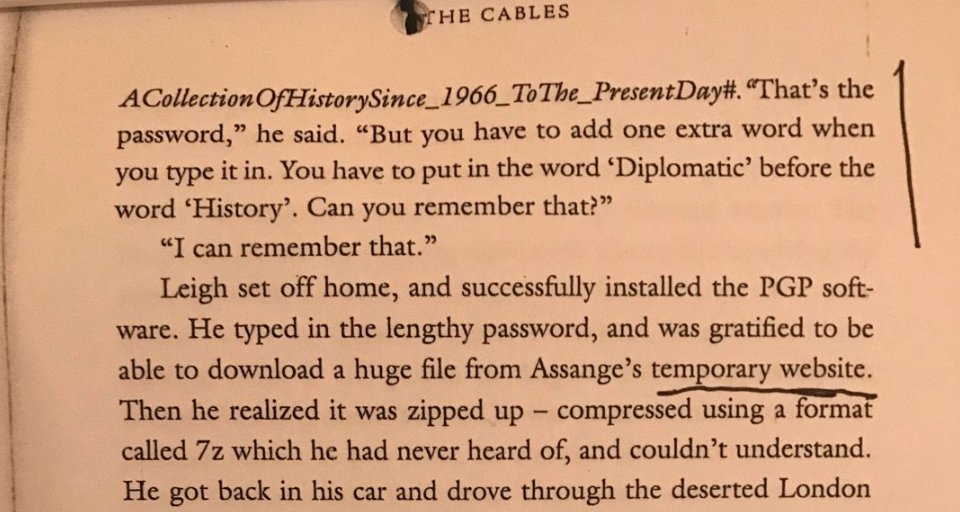

The hearing resumes only in March?!
“During Lewis’s presentation, he was interrupted by Judge Baraitser precisely once. During Fitzgerald’s reply, Baraitser interjected seventeen times.”
• Your Man in the Public Gallery – Assange Hearing Day Four (Craig Murray)
Yesterday the prosecution continued its argument that the provision in the 2007 UK/US Extradition Treaty that bars extradition for political offences is a dead letter, and that Julian Assange’s objectives are not political in any event. James Lewis QC for the prosecution spoke for about an hour, and Edward Fitzgerald QC replied for the defence for about the same time. During Lewis’s presentation, he was interrupted by Judge Baraitser precisely once. During Fitzgerald’s reply, Baraitser interjected seventeen times. In the transcript, those interruptions will not look unreasonable: “Could you clarify that for me Mr Fitzgerald…” “So how do you cope with Mr Lewis’s point that…” “But surely that’s a circular argument… “But it’s not incorporated, is it?…”
All these and the other dozen interruptions were designed to appear to show the judge attempting to clarify the defence’s argument in a spirit of intellectual testing. But if you heard the tone of Baraitser’s voice, saw her body language and facial expressions, it was anything but. The false picture a transcript might give is exacerbated by the courtly Fitzgerald’s continually replying to each obvious harassment with “Thank you Madam, that is very helpful”, which again if you were there, plainly meant the opposite. But what a transcript will helpfully nevertheless show was the bully pulpit of Baraitser’s tactic in interrupting Fitzgerald again and again and again, belittling his points and very deliberately indeed preventing him from getting into the flow of his argument. The contrast in every way with her treatment of Lewis could not be more pronounced.

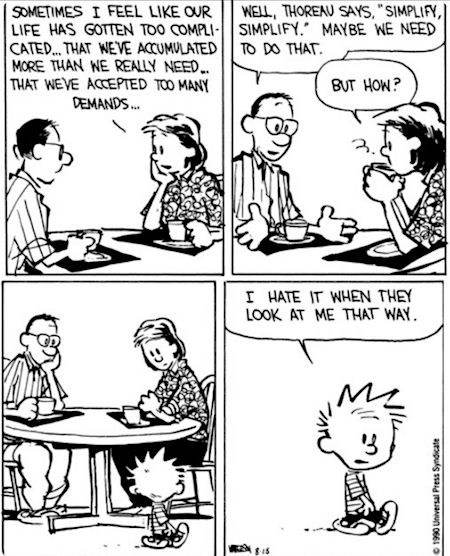

If you read us, please support us. It’s the only way the Automatic Earth can survive. Donate on Paypal and Patreon.


